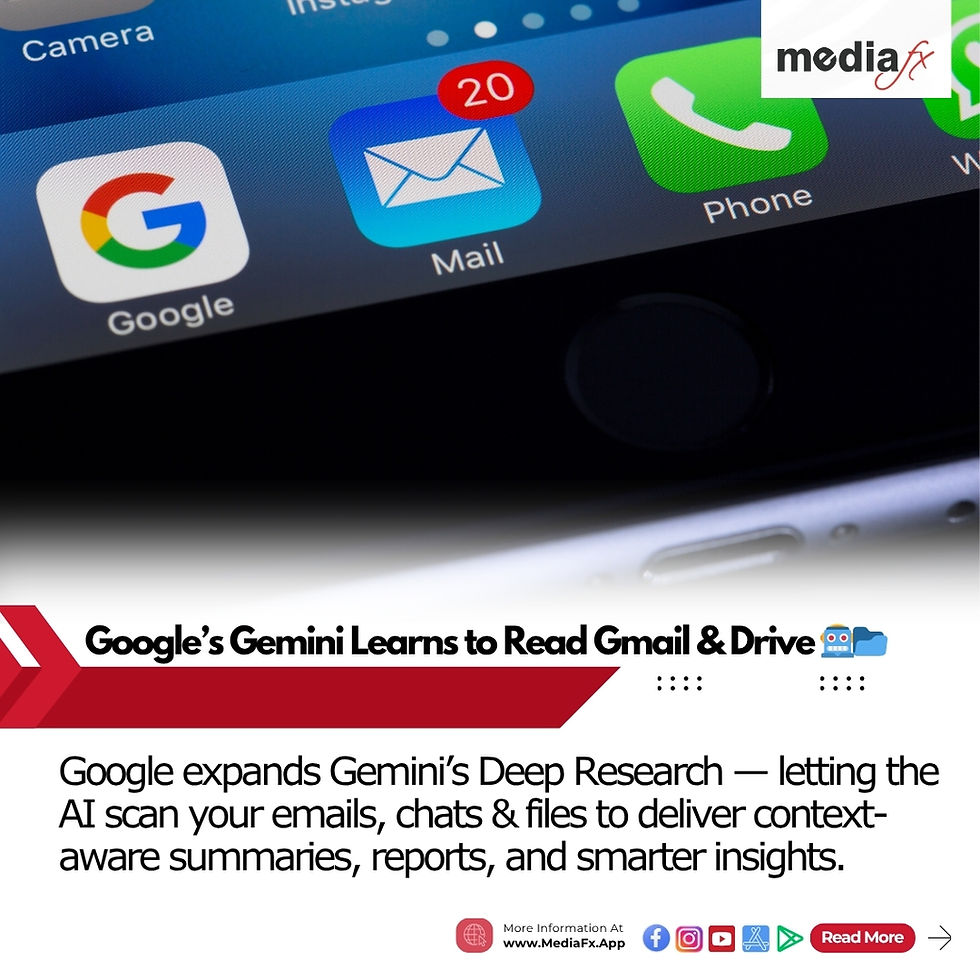📰 Gemini Goes Deeper: Google Expands AI’s Reach Across Gmail, Drive & Chat for Smarter Research 🚀📂
- MediaFx

- Nov 7, 2025
- 2 min read
TL;DR:Google is taking its AI assistant Gemini to the next level — enabling it to scan data across Gmail, Drive, and Google Chat to deliver personalized insights, summaries, and reports. The upgrade turns Gemini from a simple chatbot into a context-aware research partner — one that knows your files, projects, and priorities (securely, Google says). 🧠⚡

What’s Happening?
In a major AI upgrade announced this week, Google DeepMind unveiled “Deep Research,” a feature that integrates Gemini across users’ workspace apps — including Gmail, Drive, Docs, and Chat.
With this rollout, Gemini can now search your personal data (emails, PDFs, notes) to give smarter, context-rich answers to complex queries.
Example: Ask “Summarize all emails about the Q4 product launch and draft a response,” and Gemini will pull relevant info, cross-check attachments, and compose a draft — all in seconds.
The feature is currently being tested with enterprise and Workspace users, with plans for wider rollout early next year.
Google clarified that data remains private — no human trainers can view personal information, and processing happens within secure servers.
The tool also integrates voice and visual prompts, allowing users to upload screenshots or ask contextually-linked questions directly from Google Chat.
A Google spokesperson described it as “the next leap from assistant to collaborator.”
Why It Matters
This move blurs the line between personal productivity tools and AI copilots.
It’s Google’s biggest response yet to OpenAI’s ChatGPT integrations and Microsoft’s Copilot ecosystem.
By leveraging the billions of data points within Workspace, Gemini could redefine how users conduct research, manage projects, or draft communications.
For professionals, it means less time switching tabs — and more time acting on synthesized intelligence.
For privacy advocates, however, it reopens debates about data access vs. user control in the age of AI personalization.
Who Gains & Who Loses?
Gains:
Google Workspace Users: Gain an AI layer that understands personal context and tasks.
Businesses: Boost productivity with automated research, summarization, and documentation.
Google: Strengthens its AI ecosystem against Microsoft’s Copilot and Anthropic’s Claude integrations.
Losses:
Standalone AI Tools: Apps offering file search or summarization may lose relevance.
Privacy Purists: Concerned about deeper AI access to private data — even with encryption.
The Bigger Picture
With Deep Research, Google is signaling the start of fully contextual AI ecosystems — where assistants don’t just answer queries, but understand your digital universe.
Analysts predict that this will soon evolve into Gemini for Teams, capable of analyzing entire project repositories and suggesting actionable insights.
It also underscores the new direction of AI — not just generative, but integrative, connecting productivity, communication, and data into one intelligent loop.
As tech columnist Ben Thompson noted:
“Gemini’s upgrade means AI won’t just live beside your work — it’ll live inside it.” 💡
The race between Google, OpenAI, and Microsoft is no longer about who answers better — it’s about who understands you better.













































